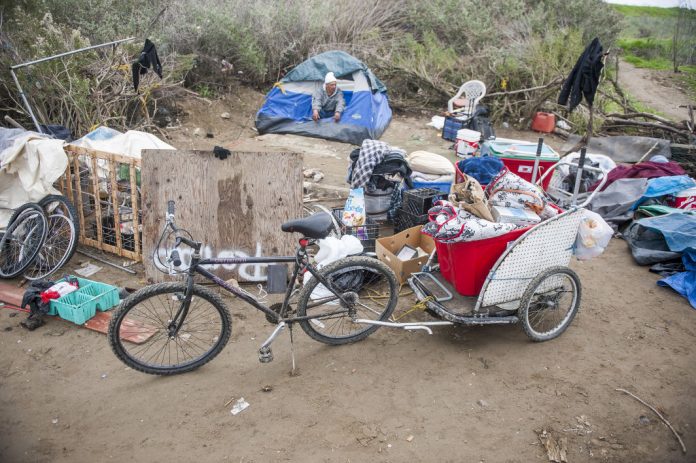Special to the Free Lance
San Benito County officials and property owners continue to seek more funding to provide more services for local homeless people, and to reduce the unhoused population.
The San Benito County Board of Supervisors discussed some of the possibilities when they met on April 12 to address the high volume of homelessness occurring on San Juan Road.
The board has had a few meetings on the topic over the course of the last year. In April 2021 there was a fire under the San Juan Bridge, thought to have been caused from a homeless encampment. Shortly after the board met and passed a resolution to immediately respond to the homelessness issue.
A few months later in June 2021 the board passed another ordinance for the San Benito River, which prohibits encampments on both private and public property. This ordinance allowed for stricter enforcement with a citation and also created a three-step process for law enforcement.
The ordinance guided enforcement to first issue a notification of prohibited activity. If activity continues to occur, officers are directed to tell the homeless population about available resources such as places to seek shelter and food. The final step in the process is to then provide the person with transportation to a shelter.
In January, the board approved a legislative request for funding to build “tiny homes.”
Most concerns of homeless reported were about vehicles and overnight parking on San Juan Hollister Road. When staff reached out to local towing companies, they found that on average it would cost $75 to $250 to tow a car. For a recreational vehicle the average cost was $1,500.
During public comments, local business owner Larry Willis said, “I would be happy to pay the $1,500 per mobile home to get rid of them.”
Willis mentioned there is a homeless population across the street from his 100-employee concrete manufacturing business. His employees have come to him and reported they feel unsafe due to the homeless coming on property and defecating, urinating and dealing drugs.
“I would think that our employees and their families would have at least as many rights as the people across the street,” Willis said.
Enrique Arreola, deputy director of the county Health and Human Services Agency, attended the meeting to share some statistics on what the county has done thus far to help the situation at hand.
Arreola mentioned the Winter Shelter Program that recently ended served 16 families for a total of about 50 individuals. The Home Resource Center, a shelter operated by Community Homeless Solutions, is “still going strong,” Arreola said.
There is also the Helping Hands Program and Supportive Housing Program which is looking at a more long-term solution. The SHP has 11 units currently being leased with a total of about 20 clients who have been there for about a year.
Project Room Key is a program ending in June, which provides emergency shelter in local hotels.
Arreola mentioned there has been activity going on to bring in more funding as well. He mentioned a grant of $1.15 million received from the Community Development Block Grant, which went directly to the rehabilitation of shelters including their parking, interior floors and painting.
On top of the grant received, the county submitted an application for $2.75 million for transitional housing which will target homeless families and help build 11 units in phase two, as phase one built five units.
The Homeless Housing Program will also submit a state application due by June for about $310,000 to provide services and housing to homeless individuals or families.
While funding is in process, the board made note that they are aware of the urgency of the situation as it impacts the businesses and surrounding neighborhoods.
“Today’s just a discussion, we can’t act on it,” Supervisor Bea Gonzales said.
Supervisor Kollin Kosmicki requested the board look at more long-term solutions.
“I am very frustrated and I am very sympathetic to Mr. Willis and other residents,” he said.
Supervisor Bob Tiffany amongst other members mentioned they want to fix the issue in the most humane way possible.
“I do not want to sound as though I am not sensitive to the homeless situation,” Tiffany said. “I think we need to continue to make sure there is outreach, make sure people know where there are beds, places they can go and get food.”
Gonzales said she wanted to see the issue come back at a future meeting, to which the board agreed to add it as an urgency item.










